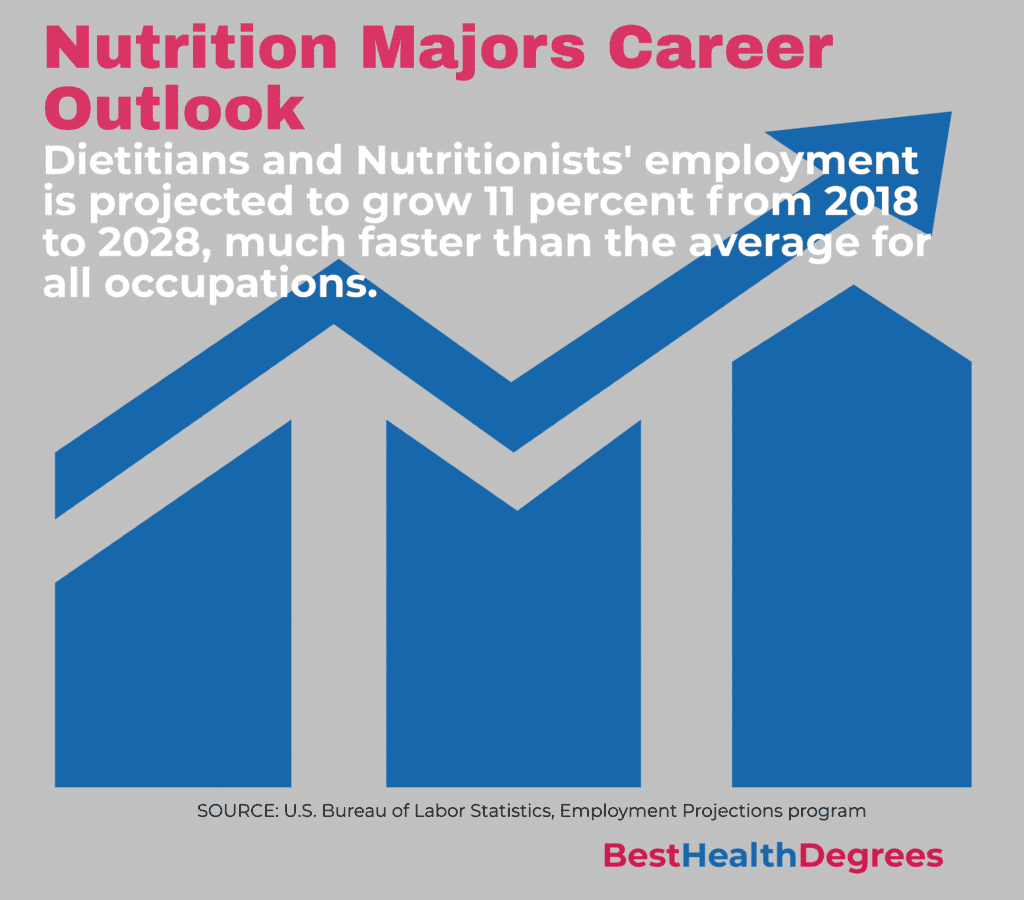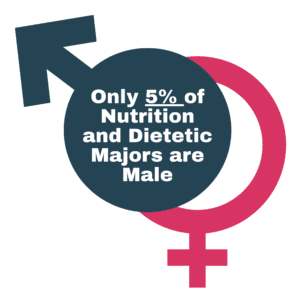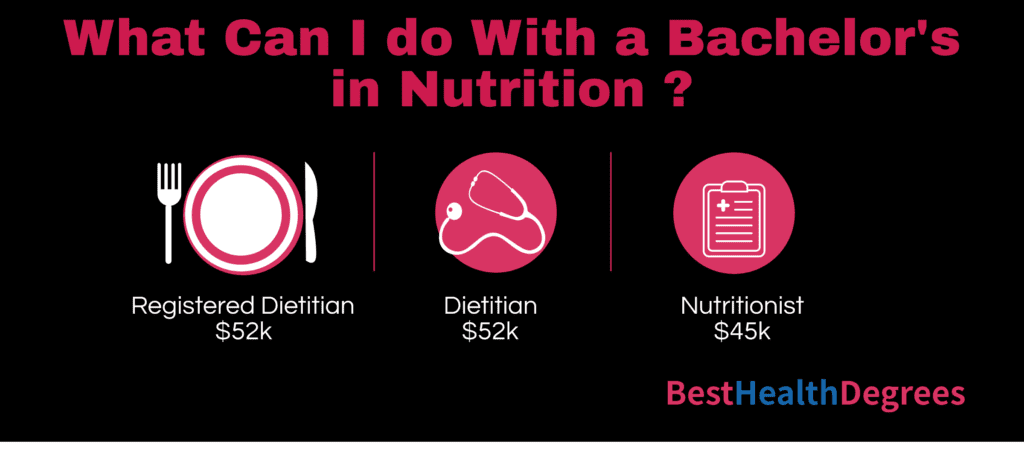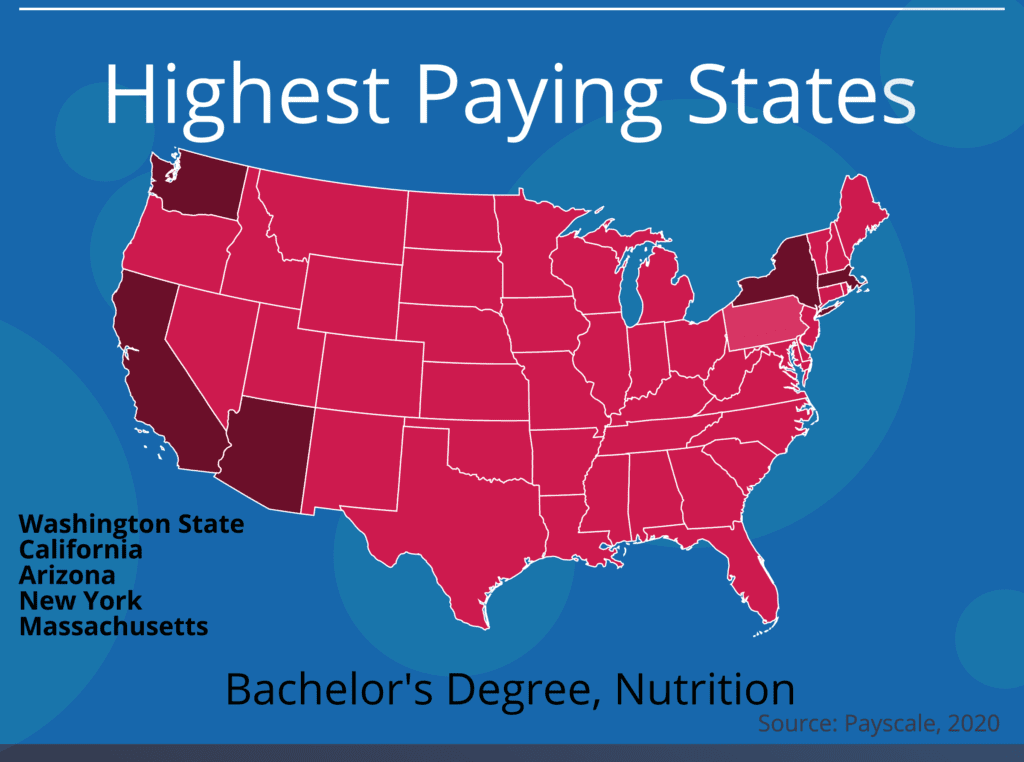Key Takeaways:
- A degree in nutrition offers varied career paths including roles as registered dietitians, nutrition consultants, public health advisors, and food safety auditors.
- Nutrition graduates can work in hospitals, wellness centers, public health agencies, private practice, and the food industry.
- Many nutrition jobs require professional certification or registration, particularly for those aiming to become registered dietitians.
- The field of nutrition is experiencing growth due to increasing awareness of the role of food in health and wellness.
There are many jobs you can do with a degree in nutrition, including sports nutritionists, food safety auditors, and pediatric nutritionists. Thinking about becoming a registered dietitian? Wondering, is nutrition and dietetics a promising career? Is becoming a registered dietitian worth it regarding salary potential and personal growth opportunities? There are so many pros and cons to consider when deciding whether to enter this field of study.
This article highlights some of the reasons to become a dietitian that will be helpful for all kinds of prospective students to think about. High school juniors and seniors and those thinking about switching careers later in life should know that being a nutritionist dietitian can be very rewarding. It’s no secret that there’s an obesity crisis occurring in the US and many other parts of the world right now, and registered dietitians get to be integral parts of solutions.
A registered dietitian nutritionist must complete certain courses of study. Dietitian and nutrition education includes completing a bachelor’s degree, ACEND-accredited supervised practice program, passing a national examination administered by the CDR, and completing specific continuing nutrition education requirements throughout one’s career. The registered dietitian nutritionist education is rigorous because it enables professionals to make a lasting difference in private and public sector work.

What is a Nutrition Science Degree?
But you may be wondering, The best way to find out what a nutritionist dietitian does is by getting down to the root concept of nutrition science. There are many ways to formulate a nutrition science definition. Still, one way is to say that it’s the study of the components of food, metabolism, and other interactions that result in healthy and diseased states over time.
Of course, proper nutrition involves the consumption of enough nutrient-rich foods, and nutritionist responsibilities often include steering people towards (and crafting policies that support) these ideal options. Nutritionist responsibilities also frequently envelop the study of the psyche, which propels individuals to eat and move in specific ways, causing healthy and unhealthy states.
So, is nutrition and dietetics a promising career? It depends on whether helping people live longer and more productive lives is a motivational factor for you. Being a registered dietitian enables many professionals to help others live better for a longer period, inspiring many. What are being a dietitian’s pros and cons? The good news is that there are so many career paths available to people who study nutrition science, especially if they also study other related industries such as biomedicine, social services, disease prevention, agriculture, humanitarian assistance, public health, and others.
Prospective students would be wise to ask around their networks to determine what registered dietitians think of their chosen field. Was the investment of time and money worth it? Do they feel being a nutritionist dietitian enriches their lives? Now is the perfect time to get some insights before applying to an accredited program and jumping in to study.
Accreditation for Nutrition and Dietetics Programs
Looking for a list of the best colleges for nutrition? There are plenty of top schools for nutrition and dietetics to choose from. The only tricky part is choosing one that suits your interests, budget, and career goals best. The good news is that the National Center for Education Statistics website has a list of colleges that offer a major in nutrition in every state, from Alabama to Wyoming and every state in-between.
Just click your state as well as a few neighboring states to quickly find top schools for nutrition and dietetics in your area. Prospective students who plan to declare nutrition science majors would be wise to check out this list from CollegeBoard.com. Nutrition science majors complete coursework, have nutrition research and internship opportunities, and often counsel peers on nutrition principles and healthy habits.
Best Universities for Nutrition and Dietetics
Many of the best universities for dietetics and nutrition courses of study in the US offer ACEND accredited coursework requirements. But, some of the best universities for dietetics and nutrition are the University of North Carolina at Chapel Hill, Purdue University, James Madison University, the University of Texas at Austin, and the University of Washington.
These schools offer job placement assistance, have a high graduation rate and alumni salary, an excellent reputation, and low tuituon cost. But, no matter what part of the country you may be in, there are major nutrition colleges not too far away.
Picking the Best Nutrition Degree Program for You
Some of the best dietetics and nutrition universities are in the US. Prospective students must pick programs that fulfill ACEND accredited coursework requirements. These degrees are respected in workplaces and graduate programs. Do you want help others and are you fascinated by the body’s biological processes? Then, consider applying to some of the best colleges for nutrition.
Many graduates have found that this field offers solid career opportunities to serve and grow professionally. ACEND-accredited coursework requirements include completing specific courses of study and supervised practical coursework in a chosen specialty area. Look up the best universities for dietetics and nutrition in your area and start narrowing down the ones you’re most interested in today! A career in nutrition and dietetics is highly rewarding and can be very lucrative.
Pursuing a Nutritionist Degree

Looking to get a nutritionist degree? Now is the perfect time to start your career in this in-demand industry. A nutritionist degree involves a broader field of study than dietetics. Many states require that dietitians and nutritionists be appropriately licensed to open their own practices and work at professional doctor offices and hospitals. Dietitian and nutrition education requirements include the following requirements set out by the federal government.
Most nutrition professionals and dietitians complete bachelor’s and master’s degrees and then sit for a national exam. Upon completing these dietitian education requirements, people may practice as RDs (registered dieticians) at hospitals, food service companies, and other public and private organizations.
There are various didactic programs in dietetic options for people to choose from – both online and in-person, many of which have ACEND accreditation. There’s an excellent search function for a didactic program in dietetic options for those interested.
Dietetics Degree vs. Nutrition Degree
Many prospective students conduct extensive searches to discover the difference between a dietetics degree and vs. nutrition degree. These nutrition professionals are practice in similar but related fields. Nutrition science courses often involve studying food production and the resulting issues that arise from various methods. Food science can even be offered as an area of specialization for nutrition majors.
Nutrition science courses also hone in on the science behind people’s health and how food quality is managed and maintained. Many colleges offer nutrition programs in all areas of the country – including Southern New Hampshire University, Walden University, and countless others. Colleges offering nutrition degrees can be found throughout the US, so don’t hesitate to start your search for the ideal program to meet your needs and career goals today.
What Can You Do with a Bachelor’s Degree in Nutrition and Dietetics?
With a bachelor degree and dietetics in hand, many doors open to graduates in the public and private sectors. Many graduates immediately enter specialty master’s and then-doctoral programs, but some launch their careers right away. Types of nutrition programs include sports nutritionists, food safety auditors, pediatric nutritionists, and exercise scientists. There are types of nutrition degrees to meet each person’s interests and aspirations. The sky is the limit for those with bachelor’s degrees in nutrition and dietetics.
Coordinated Program in Dietetics
One of the best ways to launch a career with a nutritionist degree is by completing a coordinated program in dietetics. It’s a handy resource for all kinds of students – those just starting out their careers and career-changers alike. Pursue a nutritionist degree with solid coursework and hands-on internship experience to get your career off to an excellent start.
Nutritionist Online Programs
Now is the perfect time to take your career to a whole new level by entering one of the nutritionist programs online. There’s no need to interrupt your entire life by going to an in-person school when there are plenty of online nutrition degree distance learning programs available. So, a nutrition degree distance learning program is a smart career move. Graduates greatly enhance their earning potential without interrupting their jobs or personal lives. It’s a win-win!
What are you waiting for?
There’s no need to wait to achieve your dream of completing one of the registered dietitian programs online. There are plenty of ACEND-accredited online programs available to ambitious students. Keep your full-time job and family responsibilities on point while achieving career aspirations by completing one of the ACEND-accredited online programs.
Job growth expected for graduates of nutritionist online programs
Did you know that the federal agency, the Bureau of Labor Statistics, predicts the market for jobs for nutrition professionals will grow by 15% between 2020 and 2030? So now is the ideal time to begin one of the registered dietitian programs online. Nutritionist programs online enable people to join this ever-expanding, fascinating field of study. There is even a didactic program in dietetics online that people can complete. Narrowing down the options for a didactic program in dietetics online is tricky because there are so many variables. Perhaps choose a specialty before starting the school research process to prevent information overload.
Online Nutritionist Certification and Dietetics Certification Programs
Completing a nutritionist certification is a requirement to become a registered nutritionist (RN). In order to be eligible for various positions in private and public workplaces, individuals much have a nutritionist certification. A wise place to start would be to look at the requirements for nutritionist certification in your state. Many different certification types vary from state to state.
Dietetics certification is a much more complex, time-consuming process, and is much more regulated by the government. While dietetics certification is a more involved process, graduates often find that the extra effort was well worth it.
Looking for the Best Online Nutrition Certification Program?
There are plenty of options available for those seeking the best online nutrition certification program. Students can complete some accelerated programs in as short a time as 6 weeks.
Interested in Continuing Your Nutrition Education?
Check out post-baccalaureate dietetics online programs to further your career without even leaving home. For example, the University of Georgia College of Family and Consumer Services offers post-baccalaureate dietetics online courses like clinical nutrition interventions, public health dietetics, and medical nutrition therapy.

Careers in Nutrition and Health During Today’s Obesity Crisis
According to the Centers for Disease Control, almost 40% of Americans are considered obese? Nutrition professionals are part of the solution by pursuing careers in nutrition and wellness. Prospective students who want to feel fulfilled and financially stable are wise to pursue careers in nutrition and dietetics.
What are Some Careers in Nutrition and Health?
There are so many options for careers in nutrition. Helping people improve their health, create better habits, and increase their daily well-being will always be in demand. Careers in nutrition that will increase in demand in the next decade are agricultural and food scientists, fitness professionals, and health educators.
Careers in nutrition and food science have a median salary of between $55-$69,000 per year. Graduates will have opportunities to improve the safety and health of the whole mass production system in the US and globally with careers in nutrition and food science. Having a career in nutrition and dietetics is possible with a degree from an ACEND accredited program in this up-and-coming field.
Do Careers in Nutrition Without a Degree Exist?
Yes. There is potential for people to achieve careers in nutrition without a degree because it’s not nearly as regulated as the dietician industry. Plenty of entrepreneurs who educate people on nutrition principles can earn handsome incomes without formal training. But if people want to enter the job market, it’s more prudent to invest time and effort in achieving a degree to have the best prospects in the nutrition and wellness job market careers. There’s no need to quit your job or leave your family to pursue careers in nutrition and health – just sign up for an online program and complete your degree according to your unique schedule.
Want to Pursue Nutritional Science Jobs?
What jobs are available with a nutrition degree? Nutritional science jobs are in-demand in today’s modern workplace. But you may wonder, “What jobs can I get with a nutrition degree?” Graduates can look forward to becoming eligible for employment in nutrition science degree jobs such as corporate wellness consultant, public health nutritionist, and sports nutritionist. There are many paths to choose from regarding nutrition science degree jobs, so there’s plenty of room for creativity and variety.
The answer to the common question, “what jobs can I get with a nutrition degree,” becomes – you have so many options, so just apply and network to get a great job. Bachelors in nutrition jobs are abundant in the US. Furthermore, teh BLS projects an increase in job growth in the coming years, so now is a great time to begin your career.
What Jobs Can You Get With a Degree in Nutrition?
Prospective students always want to know jobs are available with a nutrition degree. So, what jobs can you get with a degree in nutrition. Lots of people start their own nutrition and personal coaching companies, often with great success. Jobs with a nutrition degree are abundant in today’s marketplace for graduates with drive and a sincere desire to help others.
The areas of the field where graduates work include clinical nutrition, animal nutrition, sports nutrition, public health nutrition, community health, nutrition research, pediatric nutrition, and also nutrition counseling. Some nutrition jobs that students qualify for with a bachelor’s degree in nutrition are listed below.
- Oncology Nutritionist
- Personal Nutritionist
- Nutrition Therapist
Going off the Beaten Path
Those looking for exciting careers in nutrition often wonder about nontraditional dietician jobs. Jobs with a nutrition degree are easy to find, but perhaps that isn’t super appealing to you. Are nutrition careers without RD possible? The answer is absolutely. But, the road to success won’t be easy. Like anything else, nontraditional dietician jobs can be hard to find, and many workplaces don’t allow people to apply for nutrition careers without RD.
Registered Dietician certification ensures employers that applicants have the proper knowledge and understanding of fundamental principles, but people can always start their businesses, negating the need for professional credentials.
How about a 2-year Nutrition Degree?
People who aren’t interested in the traditional nutrition career path but aren’t quite ready to jump into a career without a degree would be wise to consider a 2-year nutrition degree program. In just 2 years, graduates complete associate degrees that enable them to qualify for some positions as nutrition professionals at hospitals, other healthcare facilities, and private organizations.
How Long Does it Take to Become a Dietitian?
Becoming a dietician involves much more of an investment of time and effort. People must complete a bachelor’s program, do an internship, and take a registered dietitian nutritionist (RD) exam. So the answer to the question, “how long does it take to become a dietitian?” varies according to one’s course load and length of internship, but the entire process will take at least 5 years.

What is an Average Nutritionists Salary?
All prospective students, typical 18-year-old high school graduates, and career-switchers of all ages want to know how much they can earn as a nutritionist. So, how much does a nutritionist make? Geographical location and chosen specialty field of study dramatically impact salary ranges. The average nutritionist’s salary range is from $18,990-$45,970 per year. Nutritionists’ salaries should increase in the coming year as demand for their services continues to grow as the population increases.
How About a Nutrition Science Salary?
Nutrition science salary ranges vary by employer. For example, those employed in colleges, universities, and professional schools receive an average nutrition science degree salary of $38,950, whereas nutrition science degree salary ranges in vocal rehabilitation services are about $37,750. How much does a nutritionist make, you ask? Well, an average nutrition science salary doesn’t look that great.
Bachelors in Nutrition Salary vs Dietitian Salary
By now, you know that a bachelor’s in nutrition salary vs. a dietitian salary will vary a lot depending on the demand for these professionals in your city, your chosen specialty, and many other factors. Before investing the time, effort, and financial resources required to complete a degree program make sure to consider the salary expectations.
Networking will greatly enhance graduates’ career potential, so prospective students should pick schools that offer plenty of opportunities to connect with alumni. Furthermore, there are plenty of useful maps and charts about employment and dietetics salary data. Prospective students can find salary expectations for nutrition careers and salary.
Clinical dietetics salary ranges are usually from rehabilitation centers, hospitals, and other public and private institutions. You can find clinical dietetics degree salary data for your state for various in-demand jobs.
Related:
- 25 Best Nutrition Bachelor’s Degrees
- 15 Best Online Nutrition Bachelor’s Degrees
- 10 Most Affordable Online Nutrition Bachelor’s Degrees
- 10 Best Online Nutrition Certificates
- Best Types of Counseling Degrees
- What Jobs Can You Get With a Health Science Degree?
- What Can I Do with a Bachelor’s in Nutrition?
- Kinesiology and Exercise Science Salary
- What Can You Do with a Human Service Degree?
- CNA Degree and Educational Guide
- What Can You Do With a Master’s in Psychology Degree Program?
- 10 Cheap MSN Online Programs